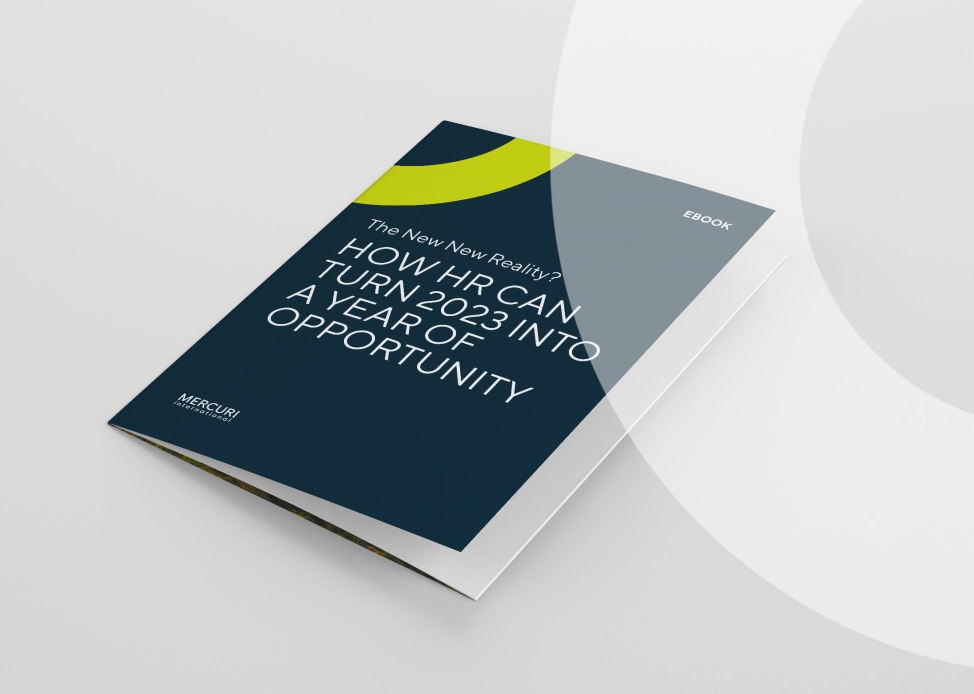In our series of three short blog posts, we’ll be taking a look at some of the key issues facing HR as they navigate the increasingly complex landscape of 2023. In our first, we take a look at the concept of ‘trust’ – and what it really means for team building and effective sales.
In November 2022, Mercuri International held a global sales event ‘The Sales Conference’, which brought together industry leaders from around the world. In 2022, the theme of the keynote presentations was ‘trust’ – more specifically what the concept of trust holds for the world of sales.
“Trust has always been a main driver to succeed in business…trusted companies have more loyal customers, lower employee turnover, higher revenue and profitability, and higher market value. Also, higher levels of trust result in lower costs of doing business. Not least because trust makes customers recommend your company…
…In addition, trust fosters cooperation among colleagues and increases commitment to the organization.”
“The Future State of Trust 2022 Report”, Mercuri Research.
In terms of HR, trust building works on a couple of levels. First, it’s about building trust internally – between employer and employee and between employees. Second, it’s about building trust between company and client. So let’s look at the first one. How do we build trust internally?
Trusting your employees – wherever they are
In July of last year McKinsey & Company conducted a study of over 13,000 global workers on the topic of ‘The Great Renegotiation & New Talent Pools’. The study looked in part at the reasons that employees stayed loyal to their employers. It found that 40% stated that workplace flexibility was a major motivator in whether or not they stayed in their role – only slightly behind salary (41%). Over a quarter (26%) of those surveyed stated that ‘lack of flexibility’ was a major factor in why they quit their last role.
In February 2022, over half of all job applications submitted via LinkedIn were for positions that offered some home working – the very first time this figure had been reached. The message is clear – while certain high-profile companies enforce the return to the office (Goldman Sachs’s CEO David Salomon being just one outspoken advocate), most industries are having to deal with the reality that remote working is here to stay.
For remote working to be truly successful, however, it’s going to take trust between employer and employee – with managers trusting that their workforce are being as dedicated and productive away from the office as they are when on-site.
5 ways to make a difference
HR plays a key role in this process – here are five ways that HR can help to build an environment where both employers and employees can trust the other party:
- Recruitment and Hiring: HR can help build trust from the beginning by ensuring the recruitment and hiring process is transparent, fair, and based on merit. This can help employees feel that they were selected for the role based on their skills and qualifications, rather than any other factors.
- Communication: HR can facilitate clear and open communication between the employer and employees. This can include regular meetings, feedback sessions, and town halls. By communicating openly, HR can help address any concerns employees may have and build a more trusting relationship.
- Employee Development: HR can help employees grow professionally by providing training and development opportunities. This can help employees feel that the company is invested in their growth and development, which can build trust.
- Fairness and Respect: HR can ensure that all employees are treated fairly and with respect, regardless of their role or position. By enforcing policies and procedures that are consistent and unbiased, HR can build trust in the workplace.
- Conflict Resolution: HR can help resolve any conflicts that arise between employees and employers. By addressing issues quickly and fairly, HR can help build trust and prevent further conflict.
Trust is a brand building exercise
Internal trust is one thing, but what about sales? How does ‘trust’ factor into the bottom line? Well, it’s not just work that is going remote – the whole sales process is becoming increasingly distant, with on-site visits declining in popularity, as sales leaders realise that they can be more efficient by conducting a lot of business via virtual or digital channels.
“On average, 30% of on-site visits can be replaced by online visits without noticeable loss of quality...
Mercuri International 2022
…By increasing the efficiency of a systematic combination of on-site and online visits, total visits can be increased by 24%.“Levers for more sales productivity and better implementation after over two years of the pandemic”.
In Mercuri Research’s survey ‘The Future State of Trust’, 99% of business leaders stated that “trust is critical in building long term relationships with clients”. But to really understand how to build trust, we need to identify its key dimensions. In our survey we did just that, and ranked them in terms of importance:
Trust-building factors regarded as important by a percentage of business leaders:
- Reliability – 90%
- Competency – 69%
- Integrity – 66%
- Purpose – 54%
- Reputation – 46%
- Security – 38%
Training your sales teams to build trust
Trust doesn’t just ‘happen’ – it’s an active, ongoing part of the client relationship building process. And it’s HR’s role to ensure that sales teams are properly trained and given the tools they need to establish this level of trust. Trust may be seen as an abstract concept, but the training required to establish it very much exists in the real world.
Discover training that works for your whole organisation – Contact us for a first, personalized assessment.



